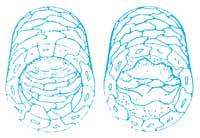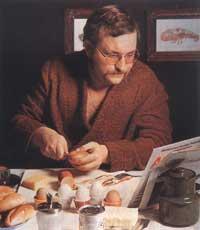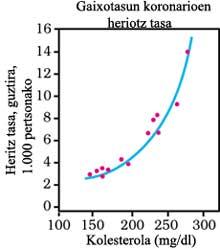Cholesterol: avoidable risk
1992/05/01 Agirre, Jabier - Medikua eta OEEko kidea Iturria: Elhuyar aldizkaria
The problem is not to completely remove all fats from our daily diet, but to rule out those that may be harmful to us.
There is currently a trend that tries to reduce or eliminate the amount of fat when we eat daily. This is a totally healthy habit, with which two types of benefits are achieved: avoid obesity and contribute to the prevention of cardiovascular diseases. As is known, fats increase the level of cholesterol in the blood, hardening the arteries (arteriosclerosis) and increasing the risk of heart disease. Although these diseases are not characterized until time, their base is fixed before, since the effects of the diet rich in fats are cumulative.
Change of habits Reducing fat intake is not so difficult: Watch out for the egg, cream and butter! Eggs with size, skimmed yoghurts instead of cream and margarine instead of butter. Chocolate, cream ice cream and pork or lamb chops are forbidden, especially cooked ones. |
Good fat, bad fat

And what does this mean? If a young person usually ingests foods with high fat content, even if he does not feel influenced in the short term, it means that the time will come when the symptoms begin to be noticed, and that then the remedy will be much more difficult and costly, besides being much more settled habits and habits fed much more consolidated.
All of the above is accepted by all. What is not so clear is whether all fats cause the same damage and what are good or bad foods. To do this it is necessary to classify the different types of fat:
- Cholesterol. The body creates it spontaneously. It is also present in various foods of animal origin. The consumption of these foods increases the cholesterol reserves.
- Saturated fats. Includes fat from beef, porcine and lamb, butter and products derived from milk fat (cheese, ice cream, etc.) Vegetable oils do not contain too much saturated fat, except those that have passed through the hydrogenation process. The body has no dietary need for saturated fats. Therefore, their exclusion from food is something that can and should be done every day. Saturated fats are easily identifiable by solidifying at room temperature. These raise blood cholesterol levels.
- Monosaturated fats. Monosaturated oils, in this type of fats very rich in olive oil, are considered neutral in their effects on the concentration of cholesterol. This causes blood cholesterol levels to not increase or decrease. This does not mean that olive oil can be consumed as much as you want, since monosaturated fats, like any other fat, are a rich source of calories, so you should not abuse them.
- Polyunsaturated fats. They are necessary to perform different corporal tasks. The body itself cannot synthesize these fats, so it gets them through the feeding. Most vegetable oils are polyunsaturated fats, e.b. Sunflower oil (except hydrogenated) and soft margarines. If much is consumed, they lower blood cholesterol levels.

The fat of fish and seafood is very polyunsaturated. Recently it has been found that this type of fat (technically omega 3) is the most useful for lowering cholesterol levels. Another reason to prevent heart attacks is that by not making platelets so viscosas prevent the formation of clots and blockage of the arteries. Practically all fish contain these fatty acids, and especially salmon, herring, trout, sardines, tuna and verdeles.
Excess cholesterol is the main cause of coronary diseases and are the first and main causes of mortality in the industrialized countries (and in which Euskal Herria is integrated). Scientifically it is shown that the process of deposit and pasting of fats on the inner walls of the arteries (genesis of the atheroma plaques) facilitates cholesterol. Over time the arteries are closing and after all the arteriosclerosis comes, a disease that can have serious consequences (angina pectoris, myocardial infarction, thrombosis, etc. ). )
Those responsible for cholesterol, apart from the possible errors of metabolism, are:
- Food rich in fats of animal origin, mainly meat, eggs, milk and dairy.
- Overweight.
- Lack of exercise.
- Diabetes not compensated.
- Alcohol.
- Tobacco (incremental factor).
As you can see, most people (and especially men) have more than one factor that leads to an excess of cholesterol.
Follow medical advice

Few novelties with cholesterol! It is a very serious topic. And ignore the recommendations of neighbors or friends, because despite acting with the best will, they can often cause more harm than benefits. For your sake, go to the doctor.
* ANALYSIS
Blood tests are essential to know the level of cholesterol we have. If you are one of those who always leave tomorrow for fear of analysis, come, this time dare and analyze.
Normal levels of total cholesterol vary with age.
According to the most accepted theories, the values that can be considered adequate are:
Age of age |
mg/mg/l |
1-2930-3940-4950-5960 and more |
120-200140-230170-250180-270180-290 |
* CONSUMPTION MEASURE
It is very important. For cholesterol to descend, during a season you will have to forget foods like eggs, jellyfish, kidneys, liver, sausages, fat meats, etc. You have to leave them).

In short, the exact compliance with the recommended food measure by the doctor and the minimum “ridiculous” possible is the key. Think that a healthy diet, with some exercise and no tobacco or alcohol, in addition to lowering cholesterol, will give you a healthier life.
* MEDICATION
If the doctor gives you any medicine, follow your directions directly without increasing or decreasing the prescribed dose. Try to be a good patient and cholesterol will be necessarily reduced.
Eicosapentanoic acid, internationally known as EPA, is a substance capable of lowering cholesterol levels and is found in fish oil that lives in cold waters. However, you would have to eat a lot of huge fish to be able to get the EPA (1.5 grams) enough to lower cholesterol. Therefore, it is usually easier for the patient to take medications (of course, when the doctor has prescribed it).
CHOLESTEROL REDUCTION INGESTION You must comply with 6 basic principles: 1. Reduction of the total amount of grass.2. Reduced consumption of saturated fats: Lard or lard, butter, cream (cream), ice cream, fatty cheese, meat fat, red meat, pork, duck and oca, sausages, sweets and coconut dishes. 3. Foods rich in protein and low in saturated fats can be consumed: Fish (white and blue), chicken, turkey, partridge and veal. Increase the consumption of complex carbohydrates, fruit and foods rich in fibers: vegetables (fresh or frozen) of all kinds, fruits (best raw), whole grains, legumes, arto.5. Increase the consumption of monas and polyunsaturated fats in their size: olive oil, sunflower oil, corn and soda, non-hydrogenated margarines. Limit the consumption of cholesterol: Jellyfish, kidneys, liver, comfortable (once or twice a month) Eggs (2-3 buds a week). |

Gai honi buruzko eduki gehiago
Elhuyarrek garatutako teknologia






